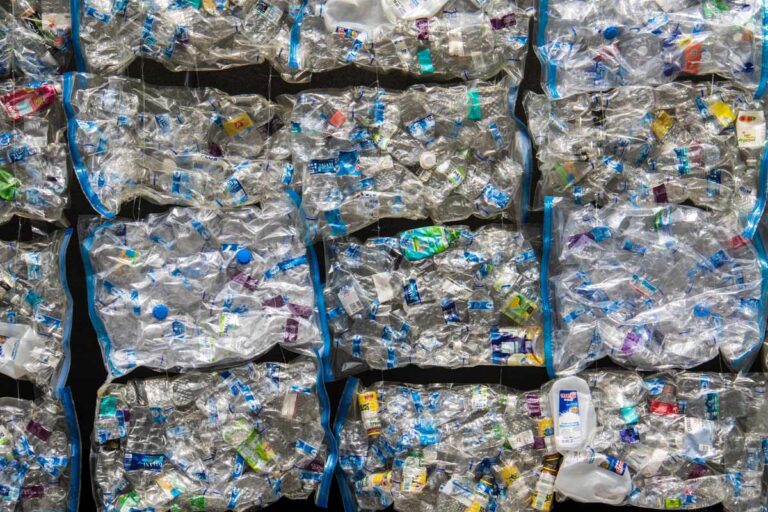Shocked by the Greenpeace advert? Here’s a closer look into the UK plastic pollution problem

Where does my plastic water bottle go once I’m done with it? It’s a fleeting question that pops into my mind when taking out the bins. It’s akin to ‘Where does our water go once it’s down the drain?’ or ‘How do they manage to put the orange jam in the Jaffa Cakes so perfectly every single time?’ But then, like a shower thought—as swiftly as it enters my brain, it’s gone again. I’ll be the first to admit, I haven’t given such an important and complex issue the attention it deserves until recently. Naively, I have trusted the UK government, which claims to be the “global leader” in tackling plastic pollution, to ethically dispose of my plastic waste.
A recent report from Greenpeace suggests otherwise, unveiling the inadequacies in our plastic recycling system. Globally, more than 90 per cent of all plastic waste has never been recycled. In the UK, just 10 per cent of our plastics are recycled on this small, rainy island. The rest is, quite literally, dumped in other countries—having a detrimental impact on wildlife, our oceans, local communities and, not to mention, humanity as a whole.
What did the Greenpeace investigation find?
The investigation from Greenpeace, released on 17 May 2021, found that Turkey has become the largest destination for Britain’s plastic waste. Investigating 10 sites across Southern Turkey, in its latest report, Thrashed, Greenpeace found plastics from major UK supermarkets burned or dumped. Plastic waste was also found in waterways, floating downstream and washing up on the Meditarian coast.
Investigators found British plastic products dumped in roads, fields and waterways abroad. Prior to 2017, China was the key target for UK plastic waste, however since plastic exports were banned by the Chinese government later that year, Turkey has become the UK’s largest, most recent target.
And the problem is only getting worse. The exports of plastic waste to Turkey have increased approximately 17 fold in the last 5 years. In 2016, the UK exported 12,000 tons of plastic to Turkey. In 2020, that number increased to 209,642 tones, equating to around 40 per cent of all UK plastic waste.
The issue of exporting a vast majority of our plastics to countries like Turkey is that it can be detrimental for those countries’ own recycling systems. “As this new evidence shows, plastic waste coming from the UK to Turkey is an environmental threat, not an economic opportunity. Uncontrolled imports of plastic waste do nothing but increase the problems that exist in Turkey’s own recycling system.” Temiz Atas from Greenpeace Mediterranean told the BBC.
The findings have led Greenpeace to urge the UK government to enact the environmental bill and use their powers to ban all plastic waste exports. The proposal also demands an immediate ban on all plastic waste to exports to countries outside of the Organisation for Economic Co-operation and Development (OECD)—as well as a ban on mixed plastic waste to OECD countries such as Turkey.
Europe’s “largest plastic waste dump”
This is an issue that is not solely tied to the UK—taking a step back reveals the urgent crisis of plastic pollution is in fact a grave global issue. Other countries across the continent have also designated Turkey as their preferred plastic dump. According to The Guardian, 241 lorryloads of plastic waste make their way into Turkey from European countries every single day—that’s a 20-time increase since 2016. The shocking volume of plastic piled on Turkey has led Greenpeace to warn Turkey was becoming Europes’ “largest plastic waste dump.”
According to the UK and EU rules, plastic waste should not be exported to countries unless it is going to be recycled. However, Turkey’s recycling rate, despite being the largest destination for UK waste plastic, is just 12 per cent, the lowest of any OECD member. Likewise, the dramatic impact of plastic waste is not only detrimental to our environment and oceans—last year, Interpol claimed that the huge increase in plastic waste in Turkey was causing an explosion in the illegal waste trade, which has been reported to cause the kind of violence usually associated with organised crime.
How can you help?
It’s easy to feel helpless in a situation like this. It’s like watching a barn burn with no water or fire extinguisher—year on year, the blaze is only getting bigger (like the amount of plastic being exported but not responsibly recycled). Unless we suddenly ditch plastics altogether, there is no black-and-white solution to this problem. However, using your power as a citizen by donating to organisations like Greenpeace and signing petitions to pressure the government into introducing sustainable policies will definitely help.
Also, it’s a no-brainer but cut down plastic usage in your daily life. Get yourself a reusable water bottle, avoid plastic straws like the plague and next time you’re shopping, ask yourself whether you really need the plastic bag. Do you really need that extra plastic? Because the planet definitely doesn’t.





